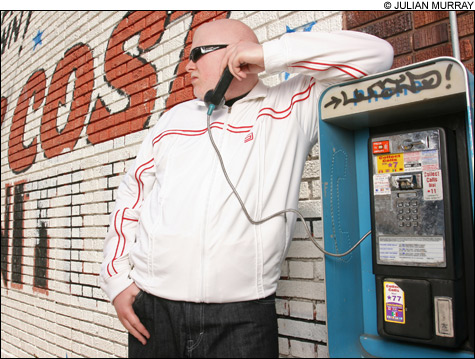
ONE FOR ALL: With the release of Us, Minneapolis’s Brother Ali has joined the elite company of rappers who’ve discovered that the world evolves — not revolves — around them. |
The only thing less common than Brother Ali–caliber MCs are profiles that don’t credit dude as “blind” and “albino” in the first graf. Despite the Minnesota-based rapper’s decade-long presence on the boom-bap atlas, the media (including me, it seems) remain overwhelmed by his unconventional background and pigmentation. That’s just the way things work in the music industry, where arrogance and subjectivity lead critics to develop Christopher Columbus–esque discovery complexes. Next thing you know, Ali will win a Best New Artist Grammy.
“It’s interesting,” he says of the strangest pigeonhole in hip-hop history. “I’ve been releasing music for years, and every article still starts with, ‘Holy shit, this albino guy raps!’ Do I really still have to be that guy every time? I understand it, but that doesn’t make it less strange. I guess I didn’t think it would change this time around, but I kind of hoped it would.”

Ali has yet to be hunted by TMZ, whose stringers would no doubt be disappointed by his sobriety and work ethic. That said, he’s one of hip-hop’s most consistent underdog heroes, with album sales and venue sizes that increase every time he cuts a project. This year alone, he’s dropped two critically applauded narratives (his The Truth Is Here DVD/EP and the subsequent full-length Us (Rhymesayers) — and debuted both on the Billboard 200. If there’s ever been an ideal realm of acclaim — particularly for someone as physically recognizable as the perpetually track-suited, ultra-Caucasian Ali — he seems to have found that serendipitous niche.
“When you’re famous, which I’m not, everybody knows you whether they like you or not. A lot of people know Kanye but don’t like him — but if they know me, it’s because they actually like me. The only difficult part about that is how people sometimes assume a lot of things about me — like that I’m against everything mainstream just because they are and because I’m an underground artist. They hinge their identity on the music they listen to, and I think that’s a mistake. The truth is that I listen to a lot of stuff that nobody would believe — I’m a big fan of Jay-Z and T.I.”
Beside his affection for commercial rap, there are some other Ali elements that reporters often miss. For one, he’s originally from Madison, Wisconsin, not Minneapolis–St. Paul, where he moved as an adolescent, and where his label, Rhymesayers, has since grown into hip-hop’s independent powerhouse. And his unusual creative approach has been largely ignored. Whereas his producer Ant used to spelunk for samples and string together loops, the pair now carry the process several steps farther, starting with crate-digging but ultimately commissioning small orchestras to lay the final product.